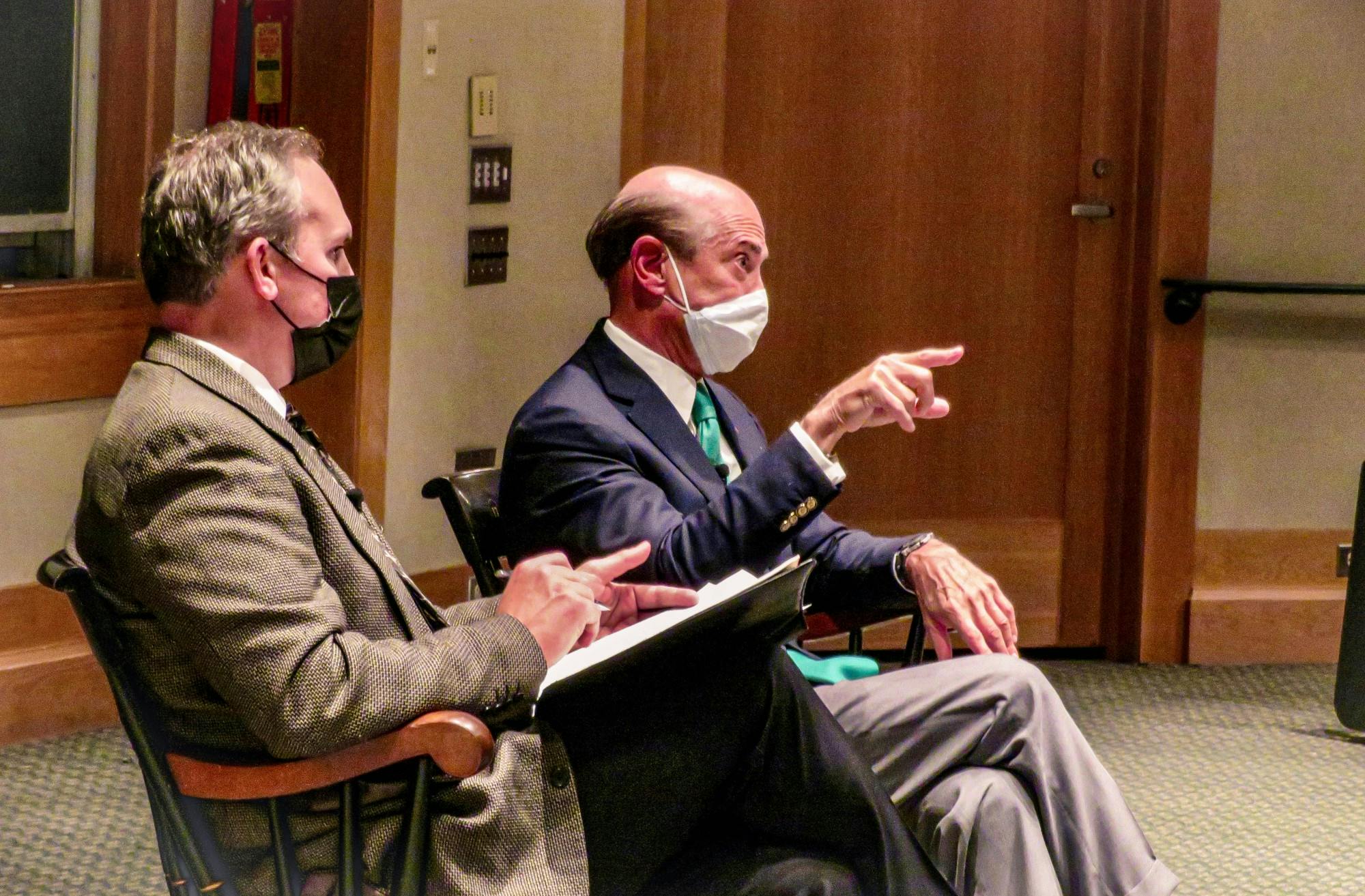On Sept. 27, the Rockefeller Center for Public Policy held one of its first in-person events since the start of the pandemic: a lecture titled “From Dartmouth to Wall Street to Rome: A Career in Business, Politics, Government, and Diplomacy” in which businessman and former U.S. ambassador to Italy and San Marino Lewis Eisenberg ’64 discussed his career.
Rockefeller Center director Jason Barabas ’93 provided the opening remarks for Eisenberg, who has held positions ranging from work at Goldman Sachs and Ironhill Investments to the Port Authority of New York and New Jersey chairman, the latter during and after the Sept. 11, 2001 terrorist attacks.
Eisenberg began his talk by discussing his experience as a Dartmouth undergraduate. He described participating in the senior society Palaeopitus — an opportunity that connected him with Nelson Rockefeller ’30, who ultimately inspired him to pursue a career in politics.
“I wanted to be able to influence and make changes — I just didn’t know how much I wanted to do that,” Eisenberg said. “I’ve had a lot of little bits [of luck] to get me to where I am today.”
Following graduation, Eisenberg initially entered the private sector, where after leaving Goldman Sachs in 1989, he established Granite Capital International Group with other Dartmouth alumni. He added that although the business was “going well” at the time, he accepted the role of Port Authority chairman in 1995.
He then shared an emotional story about his experiences with 9/11. As chair of the committee for the families of the victims of 9/11, he said handling the fallout of the tragedy became the “toughest job of his life.” He added that while that process was difficult, it inspired him to become even more involved in government.
“At my wife’s urging, I took up the role of the Republican national finance chairman for President [George W.] Bush’s reelection campaign,” Eisenberg said. “Even though I returned to Wall Street as a part of KKR investments, I stayed with the party as a fiscal conservative but socially inclusive Republican.”
Eisenberg continued serving as the Republican national finance chairman during the 2016 Republican primaries. He said that when he sat down to meet with then-candidate Donald Trump, he voiced his uncertainty that Trump would win. He added that despite the initial “awkwardness” of the meeting, Trump was later “kind enough” to offer him the ambassadorship to Italy and San Marino.
“He knew I had great fondness for Italy, and after a phone call he asked if [my wife and I] wanted to go to Rome,” Eisenberg said. “So began the most amazing four years of my serendipitous life.”
As ambassador, Eisenberg said that he was involved in mitigating Italy’s ongoing political crisis in Libya, and worked with two different Italian prime ministers — Paolo Gentiloni and Giuseppe Conte — on economic matters. He added that the most “challenging” crises of his tenure included dealing with the 2019 fallout of U.S. tariffs on European goods — a conflict he said was precipitated by the European Union’s subsidies to the French airline company Airbus — as well as the onset of the COVID-19 pandemic.
“It would take almost two hours for an ambulance to arrive at the consulate, and there was no room left in the [intensive care units],” Eisenberg said. “It was the most difficult challenge I dealt with as ambassador.”
Eisenberg concluded his talk by stressing the “threats” the US currently faces to its “democracy and freedom,” which he said has become most significant in the past 20 years. He added that because of rising extremism on “both the left and the right” and the growth of adversaries like China and Russia, American security is at risk. In view of these issues, Eisenberg encouraged Dartmouth students to get involved in public service.
“You all have Dartmouth in your blood with the friends you’ve made, the friends you keep,” Eisenberg said. “Work hard, get involved and work for your country.”
Akhand Dugar ’25 said that he felt the talk was “really interesting,” offering him exposure to the “Republican perspective.” Additionally, he mentioned that Eisenberg’s story about his experience during the Sept. 11 terrorist attacks — particularly the part during which Eisenberg, then serving as Port Authority chairman, described police escorting him out of New York City for his safety — was “powerful.”
“I was curious to hear about how he went from being an executive at Goldman [Sachs] to working for the government,” Dugar said. “Hearing how his experience at Dartmouth got him interested in politics was also pretty interesting.”
Harrison Fell ’25 said that he found the talk to be “informative” about how politics has changed over the years, noting that Eisenberg represents an example of a “[George] Bush or [Mitt] Romney style of Republicanism” that is “dying” today. He added that he was interested to learn more about Eisenberg’s experience at Dartmouth, particularly his experience campaigning for Barry Goldwater in the 1964 presidential election.
“What really stood out to me were all the unexpected twists and turns in his life, going from business to government to overseas,” Fell said.




